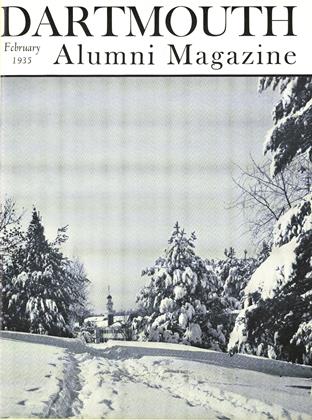A complete and up-to-date course in French. By Professor Francois Denoeu, Dartmouth College. 206 pp. The Dartmouth Bookstore.
This is Book I of Professor Denoeu's complete French course, of which Book II was reviewed in these columns last year. A year's experience with the second part has enabled the author to avoid, in the present volume, most of those minor errors which usually creep into the first printing of any textbook. It has also helped him to adapt his material better to the needs of American students. The general result is that Book I, following the same general plans as Book 11, has all the virtues of the latter and very few of its faults.
The first part of French comme il faut contains thirty-seven lessons carefully graded to suit the beginner's progress and varied enough to hold his interest, two pages of expressions which are the most often mistranslated by our students, and English-French and French-English vocabularies.
The printing this time is far more satisfactory (the French editor must have brushed up his English since he put out the other volume!). There are practically no typographical mistakes, and the alignments of corresponding French and English expressions are as good as space permits.
There still remain a few English idioms which may prove puzzling for the American student, but this could easily be remedied by giving both the English and American equivalents where they differ. In the opinion of the reviewer, some of the lessons introduce too much new material for the average beginner; some others need more practical exercises, to help fix in the student's mind the new words and rules which he has just studied. Aside from such slight details as these, there is nothing to be said except in praise of this work. The two volumes together form a complete course in French which is unquestionably as idiomatic and as up-to-date as any French grammar published up to the present time. And it is no ordinary grammar, as 1 pointed out last year, trenchcomme il faut might have been aptly entitled French without tears because of its novel approach and interesting subject matter. It is refreshing for both student and teacher to find such a course which gives training in grammar, reading, conversation, along with general information about literature and civilization and with much specific information about French life of today—the whole well-planned and written in a lively style. Professor Denoeu, following the advice of Anatole France, has written a textbook which not only arouses the student's curiosity but satisfies it as well.
 View Full Issue
View Full Issue
More From This Issue
-
 Article
ArticleHANOVER BROWSING
February 1935 By Herbert F. West '22 -
 Article
ArticleForgotten Dartmouth Men
February 1935 By Prof. H. F. West '22 -
 Class Notes
Class NotesClass of 1930
February 1935 By Albert I. Dickerson -
 Class Notes
Class NotesClass of 1908
February 1935 By L. W. Griswold -
 Article
ArticleTHE DARTMOUTH EYE CLINIC
February 1935 -
 Class Notes
Class NotesClass of 1934
February 1935 By Mariin J. Dwyer Jr.
Charles R. Bagley
Books
-
 Books
BooksM. A. Donohue & Co
OCTOBER 1931 -
 Books
BooksGAUSERIES—LA VIE SCOLAIRE,
November 1949 By Charles R. Bagley -
 Books
BooksSpiritus Loci
February, 1931 By Eric P. Kelly -
 Books
BooksFrontier Plans and Dreams
May 1980 By James Wright -
 Books
BooksSun to Sun
March 1979 By R. H. R. -
 Books
BooksMovable Bridges
APRIL, 1927 By ROBERT FLETCHER





